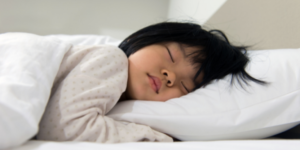
Hey, sleepyhead! Yes, we’re talking to you!
You’re caught dozing off in class again, aren’t you? That zombified look on your face is all we need to know about your current predicament.
Indeed, we know how demanding student life can be. With so much going on, it can be easy to overlook the amount of time you have to rest after a day’s work.
As a student, you have to balance your time awake while still feeling energised enough for the day! To do that, we’ll be taking a crack at “How Much Sleep Should I Get as a Student”!
Why is Sleep Important?

[Unsplash]
Before we go on, let’s start with something basic.
Why is sleep important?
Simple. Unlike your body that just needs food and time away from physical stress, sleep is the only way for your mind to stay mentally healthy!
But why is this so? Why can’t we simply close our eyes to rest without sleeping?
Well, here’s the deal: Imagine that humans all possess a number in their head. Starting from 100, this number counts down to zero without fail.
99, 98, 97… The number goes lower when you read a book, when you do your homework. 54,53,52… When you watch TV, or when you decide what to eat for dinner.
As long as you are awake, mental fatigue accumulates even if you’re not doing anything!
How Your Body Reacts to Sleep

[iStock / imtmphoto]
When it gets close to 0, you get the irresistible urge to sleep.
When that happens, various things happen inside of your body.
Your brain hits “Save”, consolidating and storing all the new information you’ve learned during the day. But it takes time to do this, so the brain sets a timer for the body: “Wake me up in 7 hours”. Of course, not everyone gets an uninterrupted 7 hours of sleep.
Exam cramming, breaking curfew, insomnia, or simply a bad habit of sleeping late; you’re forced awake by the alarm clock. What happens then?
Well, the information that is supposed to be saved goes all over the place! Those cram notes and important concepts that you’ve painstakingly memorised? Let’s just say half of it has gone out of your head.
The bottom line? Sleep is not just a luxury, it’s a necessity when memory is part and parcel to excelling in academics!
How Do I Know If I Have Enough Sleep?

[Unsplash]
Sometimes, you may not even realise that you’re lacking sleep! So how do I know if I’m sleep deprived?
1. Mood Swings
Have you ever noticed how cranky and irritable you feel after a night of tossing and turning? That’s because sleep deprivation messes with your mood-regulating hormones, making you more likely to feel stressed out with negative emotions.
2. Daytime Alertness
Are you concentrating well in your first few classes in the morning? If you find yourself easily distracted by the noise and your surroundings, then it may mean that the lack of sleep is making you lose your focus.
3. “Fishing” in Class
Well we’re going to put the obvious one last. It is, of course, the inability to stay awake in the morning! If you were a victim to the sleeping spell in the classroom, you’ve probably had your fair share of being called out in class for this!
The Recommended Sleep Duration

[Unsplash]
For the perfect amount of rest that your mind needs, the recommended sleep duration for students can vary based on age and individual needs.
But for the short answer:
As a general guideline, if you’re between 14 to 17, try to hit 8 to 10 hours of snoozefest every night. For young adults aged between 18 to 25 where caffeine intake has become the norm, 7 to 9 hours will be ideal.
But keep in mind, however, that the body constitution of each person is unique, and some of you may require more or less sleep to function at your best.
Also, keep in mind that sleeping too much is also a bad thing! Not only does oversleeping have diminishing returns, it can also be a health detriment! This is why snoozing your alarm, or waking up much earlier to get a headstart should be done at your own risk!
REM Sleep: Why Do We Need to Sleep for So Long?

So why can’t we sleep for 3 hours and be done?
The answer: We need REM Sleep.
You see, a typical sleep cycle falls into 3 stages: Light Sleep, Deep Sleep and REM Sleep.
Without going too deep into specifics, quality sleep occurs mostly during the last stage of your sleep cycle; REM (Rapid Eye Movement) Sleep.
This is where your sleep counts! Spending 20-25% of your time asleep in the REM stage is a good goal. If you get 7-8 hours of sleep, around 90 minutes of that should be REM.
REM Sleep is important because it is the stage where your mind is compensated with emotional health and learning. “We make connections and associations during REM sleep, and we mitigate negative emotional reactions accrued through the day,” says Matthew Walker, author of Why We Sleep.
But as REM happens at the last stage, some of us do not get to that point when our sleep is interrupted or cut short ourselves.
As we’ve discussed earlier on the risks of oversleeping, indulging yourself in REM sleep can also risk sleep disorders like narcolepsy. As you get older, the risk of chronic diseases also goes up from improper sleeping habits.
Are There Ways to “Sleep Better”?

So besides sleeping too little, and too much, is there a “hack” to optimise your sleep schedule?
Definitely! While medication can be the surefire way to treat stubborn sleeping habits, here are a few ways you can try or avoid to tune yourself to a better state for sleeping!
The Do’s
- Consistent sleep schedule — Condition your body regularly to a rhythm so that it will learn when to feel ‘sleepy’ and when not to.
- Cool & Dark Bedroom — Temperature-sensitive bodies, and weary eyes feel more relaxed in a well-conditioned space.
- Try Aromatherapy — Use diffusers to fill your room with the scent of essential oils.
- Relaxing bedtime routine — Engage in calming activities like reading, listening to soothing music, or practising deep breathing exercises.
- Add White noise — Play ambient nature sounds of rain, wind through a speaker or earphones
- Wear Earplugs — Cancel out noise if you are sleeping in a busy environment.
- Eat Magnesium-rich foods — Implement more stuff like whole grains, tofu, dark chocolate into your diet.
- Regular exercise — Engage in physical activity during the day.
- Listen to ASMR — Play the sounds that can trigger an autonomous sensory meridian response (popularised and found on YouTube and music streaming platforms) through a speaker or earphones.
The Don’ts
- Avoid caffeine & alcohol before bed — No Boba tea, coffee, Cola, energy drinks, liquor content before sleep.
- Limit use of electronics before bed — Blue light emitted by screens can interfere with your sleep.
Sleep Smart, Not Hard!

[Pexels]
Bad habits like improper time management or indulgence in hobbies late into the night can all play a part in a lack of sleep. As young students, we can often be tempted to turn to small crevices of time where we can do our own thing without supervision.
But at what cost? Without your recommended hours of sleep, are you able to stay alert for school? What about spending twice the effort memorising material taught in school?
If you ever see yourself falling behind your peers, think back on the importance of sleep that you’ve learnt today. The hours you’ve “saved” by sleeping less, are actually less productive!
Remember, sleep is not a luxury but a necessity for academic success, cognitive function, and your mental state.
Since we’ve talked this much, let’s end off with a movie recommendation about the hypothetical deep end of the effects of sleep deprivation. Take some time out and watch this movie called “Awake”, released in 2021! Be warned, viewer’s discretion is advised!
